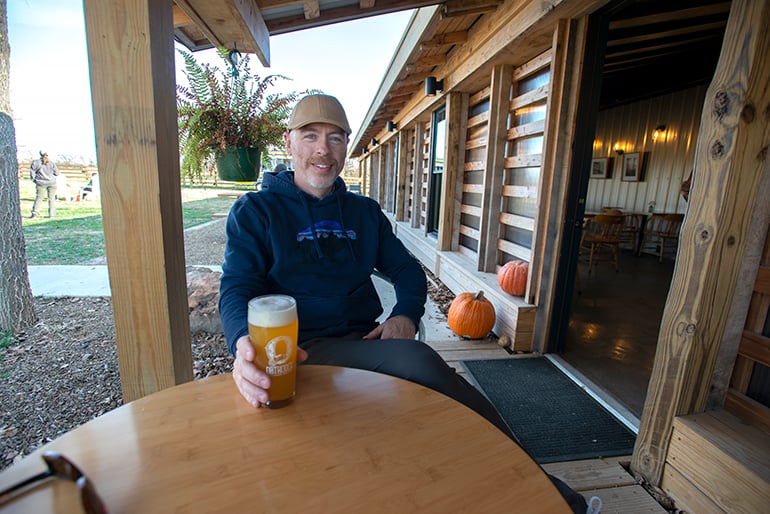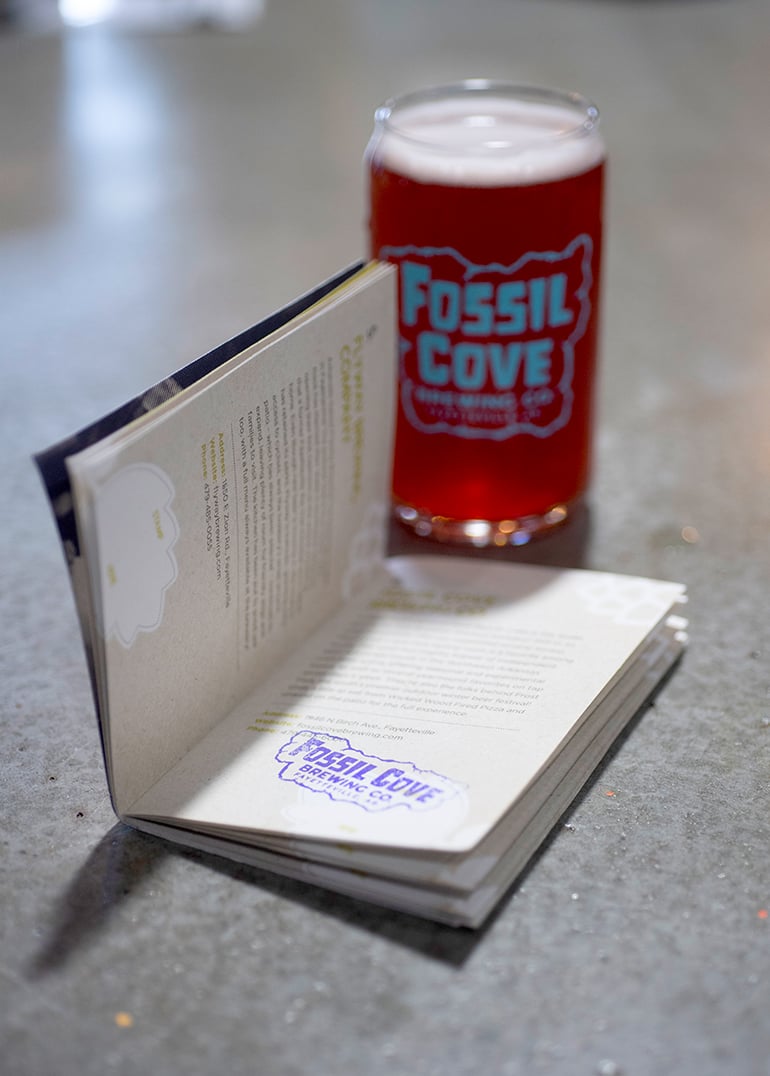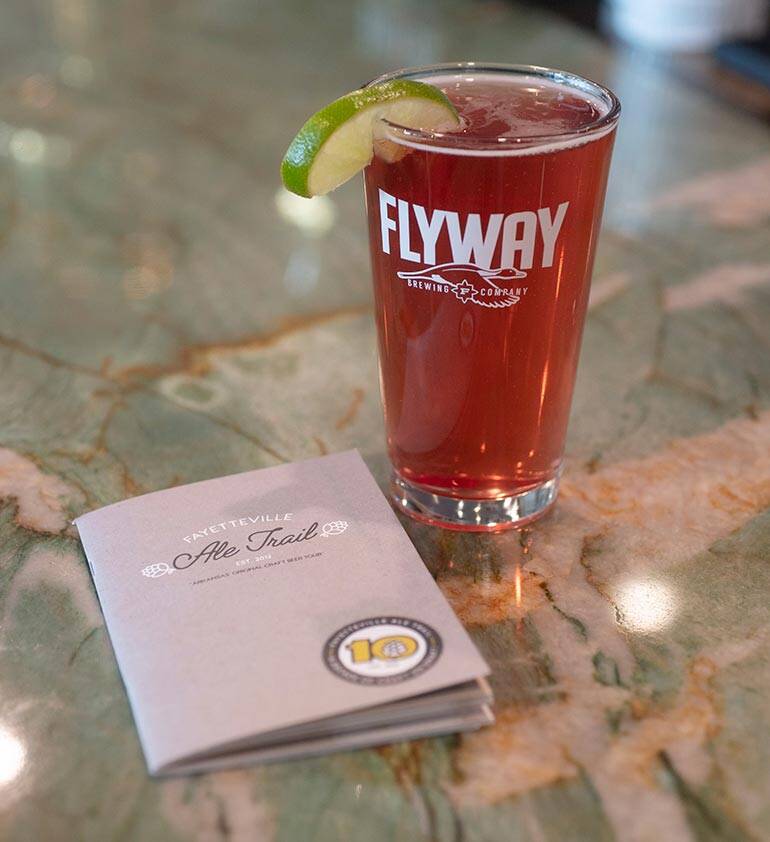Start 14-Day Trial Subscription
*No credit card required

The Fayetteville Ale Trail Puts the Spotlight on 24 Breweries in Northwest Arkansas
Journey to the region and discover local craft beverage culture as presented by Experience Fayetteville and its passport program.
There is a large concentration of breweries in the hills of Northwest Arkansas. About one-half of the state’s beermakers call the region home. This tight cluster of craft breweries makes it convenient for people intent on seeing them all; and many do see them all, often as a part of a self-guided tour known as the Fayetteville Ale Trail.
The Fayetteville Ale Trail is named for its hometown but represents the region as a whole. It was launched in 2013 by Experience Fayetteville, the city’s convention and visitors bureau. Visitors can obtain a printed passport that points them to area breweries. The passport is stamped at each stop and can be used to earn free merchandise bearing the Fayetteville Ale Trail logo when complete.
The name is an obvious misnomer since the passport program includes breweries in other cities, too. Bentonville, Fayetteville, Rogers and Springdale are the major municipalities of Northwest Arkansas. Each has a thriving beer scene and is represented on the Fayetteville Ale Trail. There are even a few outlying communities that have joined the program in recent years.
Nearly 150,000 passports have been distributed since the Fayetteville Ale Trail launched ten years ago. Sarah King works for Experience Fayetteville and is responsible for the program. She is proud of the ale trail’s growth. “Our mission is economic development through tourism,” she said. “The Fayetteville Ale Trail draws people from all over the country to experience our beer culture. Visitors contribute to the local economy and help our breweries find success. I think it has more than served its purpose in its decade of existence.”
The number of breweries on the Fayetteville Ale Trail has grown by 300% over the past decade. Today, there are 24 participants spread throughout Benton, Carroll and Washington Counties. Only a handful of breweries have yet to join the program, but King said recruitment efforts continue, and she anticipates full participation in the near future.

Brian Sorensen tries an offering from Orthodox Farmhouse Brewery in Fayetteville.
Northwest Arkansas has changed significantly over the past quarter-century. People who haven’t visited in a while would hardly recognize the place. While Fayetteville has long benefitted from the presence of the University of Arkansas, the communities to the north have been small and somewhat sleepy for most of their histories. The explosive growth of Walmart changed everything. Now firmly seated atop the Fortune 500, Walmart has turned its hometown of Bentonville into the epicenter of retail commerce. Decades of vendor relocations created a surge in population and a proliferation of new amenities.
Local beer wasn’t one of those amenities until recently. Benton County voted itself wet in 2012, paving the way for its participation in the craft brewing boom. “Many of the breweries in the program are outside our city limits now,” said King. “But we still call it The Fayetteville Ale Trail because our community remains the epicenter of craft beer culture in Northwest Arkansas.”
With nearly 100,000 people, Fayetteville is the biggest city in Northwest Arkansas. Today it is home to nine breweries, significantly outpacing Bentonville (three breweries), Rogers (four), and Springdale (three, if you count the local cidery). Fayetteville wasn’t always awash in craft beer. Prior to 1994, the only beer to be found other than mainstream lagers were Guinness Stout, St. Pauli Girl or a handful of beers shipped from overseas in green bottles. “Microbreweries” were novelties found somewhere else.
That changed when Ozark Brewing Co. (not to be confused with today’s Ozark Beer Co. in Rogers) started brewing beer in a remodeled historic structure at the intersection of Dickson Street and West Avenue. Fayetteville was already nurturing a small but dedicated community of homebrewers. Ozark’s arrival in 1994 lit the long fuse to the coming craft beer reformation with brewpub-standard stouts, IPAs, and hefeweizens.
Ozark proved popular with locals, but other beermakers were slow to follow. The next brewery in town, West Mountain Brewing Co., didn’t open until 2011. Tanglewood Branch Brewing Co. and Fossil Cove Brewing Co. followed in 2012. Apple Blossom Brewing Co. opened the next year, increasing the number of breweries in Fayetteville to five. Momentum was building and city leaders took notice. The Fayetteville Ale Trail debuted in 2013, putting a spotlight on local breweries and their cultural and economic impact.

Fossil Cove stamp in an ale trail passport book.
Ben Mills is the founder, owner and brewmaster at Fossil Cove. His brewery was the first to join the Fayetteville Ale Trail, giving him a front row seat to Northwest Arkansas’s growing interest in beer. He sees the program as instrumental to the success of the region’s breweries.
“It’s hard to quantify the impact of the Fayetteville Ale Trail, but there’s no doubt it has been a big success for everyone involved,” said Mills. “Since the first printing, we can hardly keep the passports in stock in our taproom. We are constantly asking Experience Fayetteville for more copies.”
Mills still works behind the bar on occasion, and he meets people from around the country who are in town to fill their passports. But, just as importantly, the Fayetteville Ale Trail shines a light on area breweries for nearby residents, too. “There are a lot of locals who pick up their passports who don’t realize how many breweries there are in Northwest Arkansas,” he said. “It opens their eyes to what’s going on in the beer industry, which helps all the participants in the program grow.”



